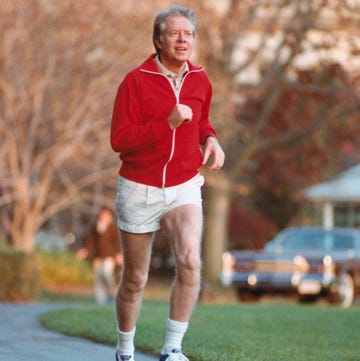U.S. Olympian Nick Symmonds is taking his feud with USA Track and Field’s logo rules to the courtroom.
On Wednesday afternoon, Run Gum, a company owned by Symmonds, filed an antitrust lawsuit against USATF and the U.S. Olympic Committee (USOC) in U.S. District Court in Eugene, Oregon.
Symmonds hopes the legal maneuver will mean his company’s logo can appear on the uniforms of athletes sponsored by Run Gum at the 2016 U.S. Olympic Trials in Eugene in July.
Under current USOC and USATF rules, athletes at the Olympic trials can display only the logo of an approved apparel or equipment company on their uniforms and bodies. Run Gum is neither.
Calls to USATF on Wednesday afternoon were not immediately returned. Patrick Sandusky, chief external affairs officer for USOC, wrote in an email, “We have only been made aware of this suit through media reports and therefore have no further comment at this time.”
In a phone interview with Runner’s World last week, Symmonds discussed what he sees as unfair exclusion of certain businesses from competition apparel. “It’s absurd that these rules are still in place,” Symmonds said. “They’re grossly anti-competitive, and they violate U.S. antitrust law in such an absurd way that I really think this is a no-brainer.”
The lawsuit marks the latest chapter in Symmonds’s struggle against USATF over rights for athletes. Last summer, after winning the U.S. 800-meter title in Eugene, Symmonds refused to sign a code of conduct requiring him to wear Nike-branded Team USA gear at all official team functions at the IAAF World Championships in Beijing.
Symmonds, who is sponsored by Brooks, said he wouldn’t sign the agreement unless it included more specific language protecting his right to wear Brooks apparel during noncompetition functions.
“To ask athletes to wear Nike-branded apparel outside of competition is well beyond their rights,” Symmonds told Runner’s World in August. “That’s just too much.”
USATF left Symmonds off its roster for the world championships in Beijing. The dispute cost Symmonds a chance to defend his 2013 world championships silver medal.
Despite Wednesday’s lawsuit, Symmonds says he’s not jeopardizing his status for the 2016 Olympics in Rio. “This is Run Gum’s lawsuit,” he said. “This is not Nick Symmonds, LLC. They’re two different companies.”
In 2011, Symmonds first raised the issue of uniform restrictions at the USATF annual meeting in St. Louis, where he and David Greifinger, an attorney and sports agent, criticized the rules that give apparel companies a monopoly on logo space.
At the 2015 U.S. Championships, USATF did not enforce those logo restrictions, which allowed Symmonds to wear Run Gum tattoos on his biceps and to furnish 20 athletes with Run Gum-branded gear.
But at the U.S. Olympic Trials, which is overseen by both USATF and USOC, logo restrictions remain in place. Symmonds hopes Run Gum’s lawsuit will change that.
“Sponsoring athletes in 2015 was hugely beneficial for our business, and it was hugely beneficial for the athletes,” Symmonds said. “All we’re asking for is a level field so that we can continue to do what we do best.”
Run Gum is represented by Michael Hausfeld, an antitrust specialist who is representing former UCLA basketball star Ed O’Bannon in the landmark O’Bannon vs. NCAA case, a suit that seeks to break the NCAA’s monopoly in college sports and create greater revenue-sharing with athletes.
N. Jeremi Duru, a sports law expert at American University, says that landing Hausfeld is a good sign for Symmonds and Run Gum. “There’s no question that [Hausfeld] lends them credibility,” he said.
It is unclear how the legal proceedings will play out and whether USATF and the USOC will choose to fight Run Gum’s lawsuit in court or seek a settlement. If both sides dig in their heels, however, the case likely won’t be settled soon, Duru says. “There might be a movement to expedite the case so that it’s taken care of before the Olympic trials,” he said. “But if it runs its natural course, it could take years.”
Duru says the court might also issue a “temporary restrictive order” if it determines that Run Gum would suffer “irreparable harm” under the current rules. A TRO would be a major victory for Symmonds, who says he expects that hundreds of athletes will be competing at the U.S. Olympic Trials this summer without an apparel sponsor.
While it’s uncertain how many companies would choose to sponsor track and field athletes if their logos could be displayed during the trials, Symmonds says he knows of at least one. “Run Gum very much wants to sponsor athletes,” he said. “That’s all I care about right now.”
Run Gum’s lawsuit would appear to run counter to the business interests of Symmonds’s main sponsor, Brooks, which is one of the apparel manufacturers that stands to benefit from the sport’s logo restrictions. On Wednesday, however, the company expressed support for Symmonds.
“Brooks stands firmly in support of athletes as they pursue their running dreams and in favor of new opportunities that allow them to make a living and inspire fans of the sport,” Brooks chief customer experience officer Anne Cavassa wrote in a statement. “We admire [Symmonds’s] passion for creating opportunities for track and field athletes where they may not have existed before.”













